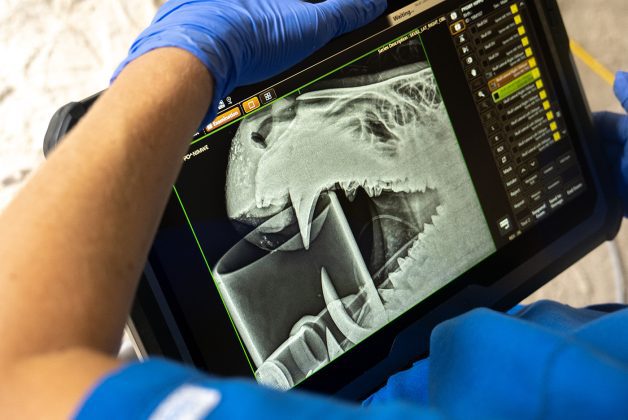|
Getting your Trinity Audio player ready...
|
Yesterday, Aubergine, an endangered male pygmy hippopotamus, was immobilized to undergo an extensive examination by the Zoo Miami Animal Health team. He was born at Zoo Miami in August of 2018 with a congenital defect that prevented the upper palate of his mouth from fully developing. This led to complications resulting from food migrating from his mouth to his sinuses which could then find its way into his lungs, leading to respiratory issues.
Through the years, Aubergine has received a variety of treatments to help mitigate possible complications that included an extensive procedure done by plastic surgeons to help rebuild the palate with only limited success. However, without these treatments, it is unlikely that he would have been able to survive. Up until a few weeks ago, the treatments, along with close monitoring, have enabled Aubergine to live a relatively normal and healthy life at Zoo Miami. Zoo Miami Associate Veterinarian, Dr. Gaby Flacke, is also a Veterinary Advisor and member of the IUCN Species Survival Hippo Specialist Group and her expertise has played a key role in Aubergine’s care.
Recently, he started to display some lethargy and a reduced appetite. After not seeing any improvement with non-invasive treatments, the decision was made to anesthetize him so that the Animal Health team could get a closer look. The exam included radiographs, ultrasound examinations, and an endoscopy of his sinuses, as well as blood collection. Though it did reveal some small pieces of matter in the sinuses which was cleared and flushed out, there were no other obvious signs of any abnormalities.
Aubergine has since recovered from the anesthesia and is back to his normal routine. The staff will continue to closely monitor him and provide non-invasive treatments in hopes that his appetite will improve, and he will fully recover from whatever was causing the abnormalities in his behavior.
Pygmy hippos are a much smaller version of their well-known cousins, the common river hippo, and usually weigh between 400 and 600 pounds whereas river hippos can reach 6,000 pounds. In addition, they are less aquatic than river hippos and are usually seen alone or in pairs rather than in large groups. Pygmy hippos are classified as endangered with less than 3,000 individuals believed to be left in the wild where they feed on a variety of plants and fruits. They are restricted to small, isolated populations within the interior forests and rivers of Liberia, Sierra Leone, Guinea, and the Ivory Coast where they are threatened by deforestation and hunting for meat.












